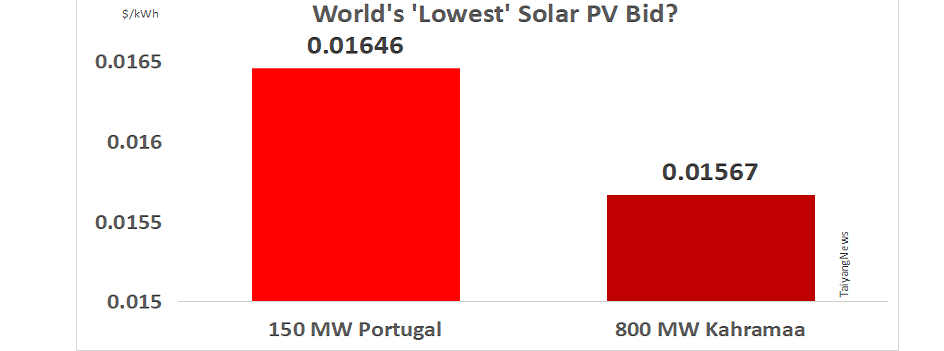- Qatar’s Kahramaa says it has received lowest winning bid of QAR 0.0571 per kWh for the 800 MW solar project it has auctioned
- The winning consortium of Total and Marubeni initially offered QAR 0.0636 per kWh as the tariff, but brought it down basing it on current financial market indices
- Financial closure for the 800 MW project is expected to be secured by May 2020
The Qatar General Electricity & Water Corporation (Kahramaa) has revealed the lowest winning bid it secured for its first large-scale solar PV plant with 800 MW capacity – at QAR 0.0571 ($0.01567) per kWh it is among the lowest tariffs for solar power projects across the world. The project was finally awarded to a consortium of Total and Marubeni (see Qatar Selects Total-Marubeni For 800 MW Solar Project).
Kahramaa President Hilal Al-Kuwari claimed the competitive price for electricity generation from a solar power plant obtained in the auction is ‘currently the lowest in the world for such a project’.
Originally, the winning duo had offered a levelized cost of electricity of QAR 0.0636 ($0.01745) per kWh to build the project, but Kahramaa says it managed to bring the quote down based on current financial market indices. The company has now signed a power purchase agreement (PPA) with the winners with financial closure expected by May 2020.
Going by the amount in US dollars, the Qatar winning bid indeed seems to be the world’s lowest. In August, Akuo Energy of France secured in Portugal’s 1.15 GW tender the largest share of 370 MW in the form of 3 projects; and for its 150 MW win it offered the lowest winning bid of €14.76 ($16.46) per MWh, which was considered the world’s new record low solar PV bid at that time (see Portugal awarded 1.15 GW Capacity in Solar Auction)
“With this project, KAHRAMAA managed to avail competitive power generation prices, save significant natural gas quantities used in traditional power generation, reduce carbon and other emissions and preserve the surrounding environment. During the project’s life time, the plant will contribute to reducing 26 million tons of CO2, which aligns with the objectives of the national program for conservation and energy efficiency “Tarsheed” to reduce 1 million tons of carbon emissions annually until 2022,” stated the government agency.












